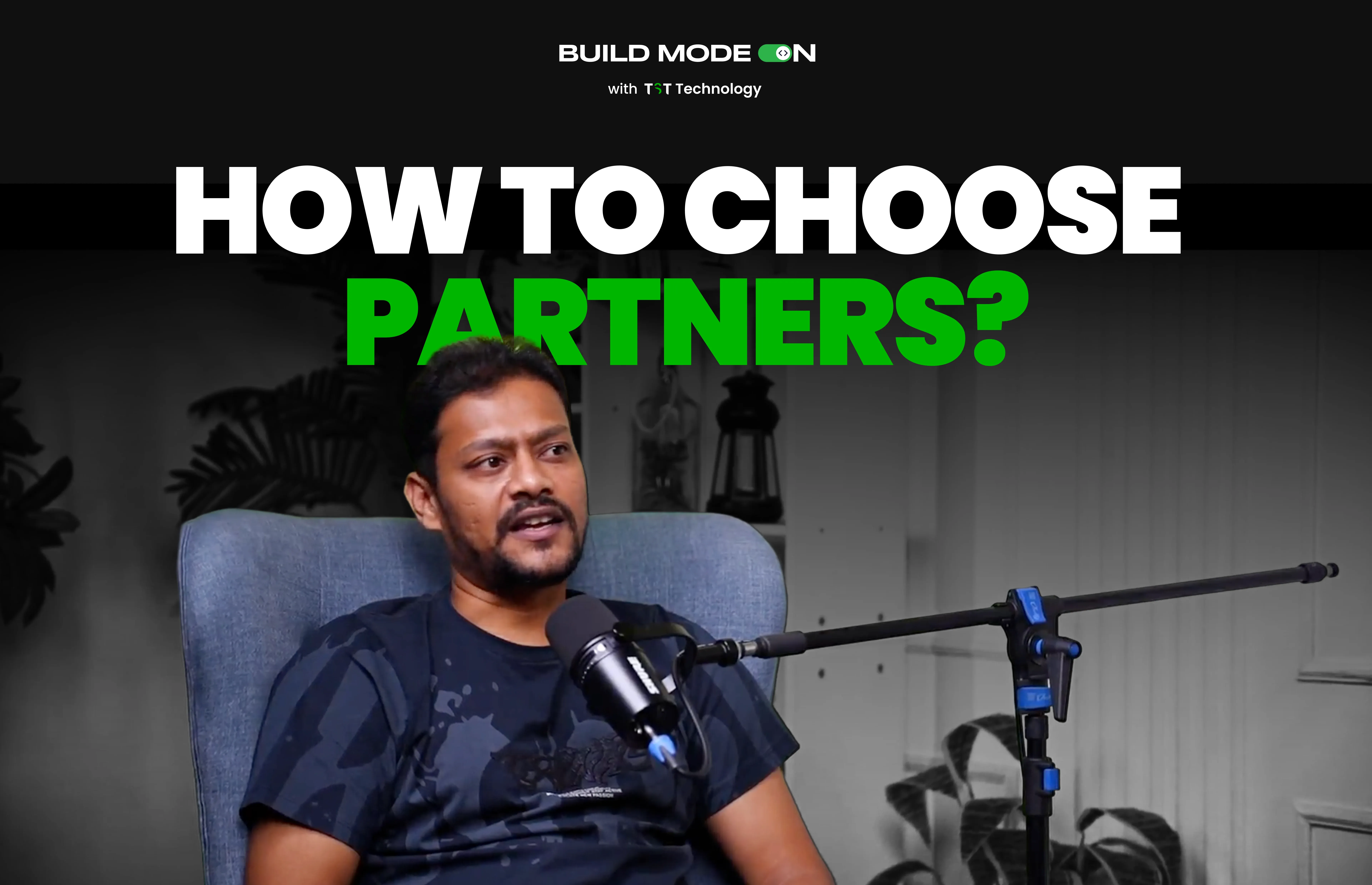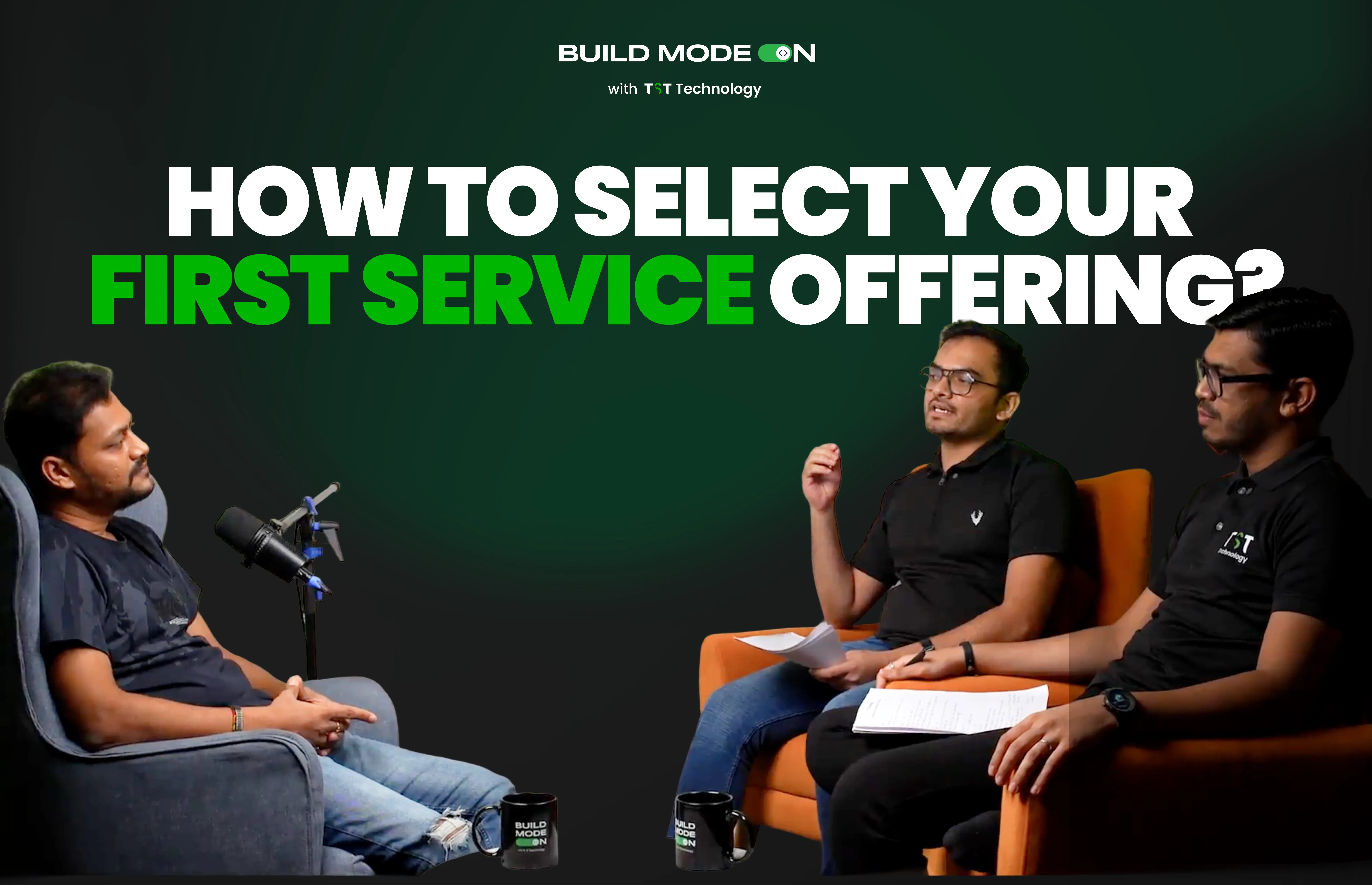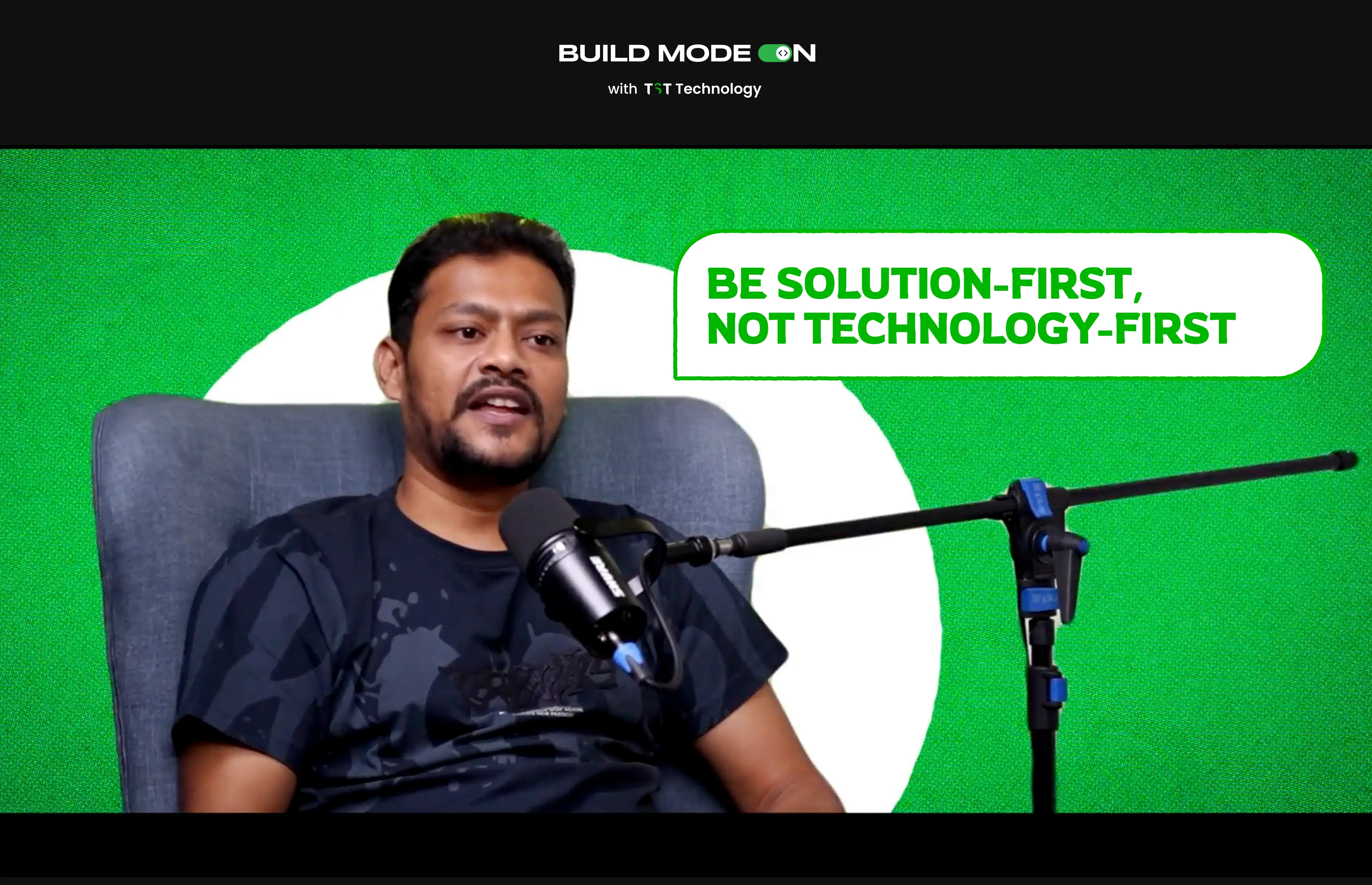We are telling you never-before-heard business secrets today.
If you want to know how you can start at 0 with the desire to build a long-standing business spanning decades, Yudiz Solutions is a good example.
Today, TST Technology brings you the man who was there right from the start- Mr. Pratik Patel, the Managing Director of Yudiz Solutions. Mr. Parth Makwana (PM), Founder & COO, and Mr. Daxesh Italiya, Co-founder & CTO, of TST Technology, talk to Pratik about this journey from the early days to now, where he has a team of more than 300+ employees and a lasting legacy.
The conversation spanned a variety of topics every founder, entrepreneur, or creator should be aware of- from how to navigate the world of gaming and creating products that stand the test of time, to what investors to select and creating long-term business plans.
Watch the entire podcast here:
Watch on YouTube
How To Choose Partners?

Starting out, Pratik remembers that Yudiz started off with four co-founders: him, Chirag, and two others. But two of them soon departed: one for financial stability with a job after marriage, and another who wished to dedicate himself to building a product-based business rather than the service-based route Pratik and Chirag had in mind.
It was an experience that taught him a strong lesson: people who have diverse visions cannot operate a business together. Goals alignment and long-term direction are non-negotiable.
The Role of a Mentor and Investor
At this initial phase, they encountered Mr. Bharat Patel, an angel investor and current Chairman and Director of Yudiz. Bharat Patel, a veteran of Gujarat's IT sector with more than 30 years of experience, became their guide and mentor. Pratik and Chirag would frequently take his opinion on important matters, relying on his counsel and sector insights.
Pratik recalls how, sometimes, they questioned the relevance of some of his suggestions, such as getting into professional groups like GESIA or following stringent government compliance. But those same actions proved to be priceless when Yudiz scaled and later went public.
Why Three Partners Work Best?
Pratik also shares an interesting perspective: the ideal number of business partners is three. With three, there’s always a clear majority in decision-making. When two disagree, the third partner can bring balance and resolution, making things move without a stalemate.
For Pratik, finding the right partner is not merely a matter of skills. It's about vision, values, and wisdom that you can bring to the table.
How To Select Your First Service Offering?

Choosing the first service offering is perhaps the most critical and challenging choice for new entrepreneurs. Most who venture into businesses following corporate careers fall into a trap: they do the same service they do at work. Although it seems familiar, it usually results in entering an existing market dominated by established behemoths.
At Yudiz, the narrative was different. The founders hadn't left corporate careers, and they didn't begin with extensive technical knowledge. What they did possess was business acumen; a knowledge that technology would always change, yet customer demand should dictate their direction. Their strategy: don't merely sell what you know, sell what the market requires.
Spotting Untapped Opportunities
In 2009–10, the IT sector was on the boom, and Android was just starting. While everyone was busy with web services, Yudiz saw a hidden opportunity: developing apps for Android. There were hardly any people who even knew that they needed apps then, so the first task for Yudiz was to make website owners aware of the potential for mobile apps.
The Early Challenges
As with any new business, the ride wasn't smooth:
- Leaving saturated markets alone
The idea of competing with large, incumbent companies in web or enterprise services didn't make sense.
- Creating expertise from scratch
Even their employees didn't know Android initially. But rather than seeing this as a barrier, they welcomed learning together, becoming masters of the technology as demand picked up.
The Payoff
This daring decision paid off in a hurry:
- First-mover advantage
Since there were not many players in Android development, Yudiz picked up clients quickly. Before the market caught up, they had already established a robust portfolio and reputation.
- Intelligent pivots
Within two years, when GTU introduced Android development courses and the market turned crowded, Yudiz pivoted to iOS app development.
Their vision allowed them to lead. They had already spent on iMacs and iPhones for testing, which most new entrants could not afford. Clients who developed Android apps now require iOS apps as well, and Yudiz was equipped with matching services.
Growing with Market Changes
By 2016, Indian internet speeds had improved dramatically, giving rise to a wave of online entertainment. Yudiz saw the wave early and diversified into mobile and Unity-based gaming. They employed recent graduates who had completed game development programs and established a new portfolio specific to youth demand.
Lessons for Entrepreneurs
Pratik Patel's story teaches us that the correct service offering is about observing where the market is going.
❌ Don't join saturated markets simply because you possess the expertise.
✅ Identify untapped markets with massive growth possibilities.
✅ Acquire and evolve together with your team.
✅ Shift when competition rises, and introduce complementary services to keep clients on board.
✅ Be ahead of the game and prepare for emerging trends before they enter the mainstream.
Such a mindset helped Yudiz develop from a tiny startup into a well-reputed worldwide technology firm, ever one step ahead of the curve.
“Be Solution-First, Not Technology-First”

As Yudiz expanded, one fundamental change characterised their success: they dropped thinking technology-first and adopted solution-first thinking.
Where they used to pose the question, "Which technology do we use?", they now posed the question, "What is the most effective solution to this client's issue?" Only after that did they select the technology that suited the response.
Pratik thinks that this approach is essential. No business today can rely only on being a technology business. New tools, languages, and frameworks come out every month. If you limit yourself to one or two, you'll always be lagging behind.
Rather, being solution-focused future-proofs you. You're then always focused on your client's actual needs, no matter how quickly technology changes.
And in the age of artificial intelligence, this lesson is more important than ever. With AI tools, coding has never been simpler, but solving problems is still a rare thing. It's easy to write code, but not everyone can invent the correct solution for a human problem.
That's where businesses succeed: not with the latest technology, but with the most intelligent solutions.
“Always Copy Mindset And Ethics From Success Stories”
While constructing a business, Pratik focuses on an important point: don't emulate the success stories' playbook blindly.
Why? Because situations change. The market dynamics, resources available, team abilities, and even the world trends during their success would have been quite different from yours in the current moment. Mimicking another's precise steps without adjusting to your current context has a high chance of failure.
Rather, Pratik proposes prioritising what doesn't shift, aka ethics and mindset. The values that fuel long-term growth and resilience are industry-agnostic and timeless. Whether it is an unrelenting emphasis on fixing problems, upholding transparency with stakeholders, or decision-making with integrity, these are the kind of principles that stand the test of time.
He also refers to vision as one of the most important learning areas. Learning from how successful entrepreneurs defined their company's growth vision can assist founders in planning for the future in a manner that is flexible to their own situation.
In brief:
❌ Do not replicate processes.
✅ Copy mindset, ethics, and vision.
This change in mindset assists founders in remaining original yet still taking inspiration from others who preceded them.
What Do New Gaming Businesses Need To Remember To Succeed In India?
Pratik brings to light that the gaming world these days has two different trajectories: hardcore gaming and real-money gaming.
Most of the new founders pursue the real-money side with the hope of becoming the next Dream11 or making quick-win opinion poll games. But this is a trap. The cost of acquiring users is too high and the legal requirements are intense. It's not a sustainable path to creating a gaming company unless you are ready for huge financial as well as regulatory issues.
In the early days of the industry, people could say, “I’ll build 10–20 games, and maybe one will go viral.” That era is gone. Today, success in gaming is not about blind luck but about long-term vision and structured planning.
Modern founders must think carefully about:
- How will the game rank in the App Store and Play Store?
- What kind of levels, tournaments, or goodies will keep players engaged?
- How can in-app buys be structured to support revenue?
The truth is, creating a successful game means intense research, constant experimenting, and waiting around. It's a model that's given time to mature. You have to have money to tide you through the first few years, and only people with patience and foresight will get the benefits.
As Pratik points out, once you work out the recipe for creating a game that captivates gamers and makes money, you have cracked the actual code of gaming success.
How Should You Choose Investors For Your Business?
Deciding on the right investor is one of the most important choices a founder will ever make. It's not merely about the finances but about establishing a long-term relationship that fuels your business's growth.
Grasp the deal fully
Before you sign anything, ensure that you have a complete grasp of what every clause implies. Don't gloss over the legalese. Have an expert or advisor explain it to you. A misinterpreted agreement can cause serious issues later on.
Seek synergy, not merely funding
If all you want is money, a bank loan may be better for you. Investors invest more than money; they invest expectations, influence, and participation in your business. If your vision and strategy are the same as theirs, the partnership can be great. Otherwise, it will only cause conflict.
Ask the right questions
Don't be afraid to inquire from would-be investors what they need from your business. Do they anticipate quick exits, or are they in for long-term development? Their feedback will inform you if they're the right people for your expedition.
Pratik Patel stresses that the greatest investor relationships are founded on common values, effective communication, and mutual trust. When collaboration feels like teamwork, that's when your enterprise really thrives.
How Did Yudiz Get Its IPO?
If it were just one thing you were looking for, you’d be surprised. It was the combination of all these factors, with a huge credit to Bharatbhai’s insistence on getting all the business books and legal affairs in order, that kept the IPO journey smooth sailing. They didn’t have to scramble for registrations and documents at the last minute and get overwhelmed by it. They were silently doing it, routinely, for years, so when the time came, they were quite prepared.
This preparation, along with their company growth in the Mobile Gaming sector with trust and quality as their identity, made Yudiz’s IPO launch a huge success.
Conclusion
This Zero to IPO Ready podcast offered real-world, experience-driven takeaways from Mr. Pratik Patel's insights that any entrepreneur can learn from, whether it’s long-term vision, the patience to build something sustainable, or the foresight to choose investors who truly share your values.
At TST Technology, we believe that discussions such as these define the future of technology and business. If you'd like to learn more about how we can help you develop your next big project, you can schedule a free call with us.
We’d also love to hear from you. Comment below and tell us which people and topics you’d like us to bring on future episodes of Build Mode On. Your suggestions will help us create even more valuable conversations for the community.
See you next time with another real-life entrepreneur sharing their secrets!






